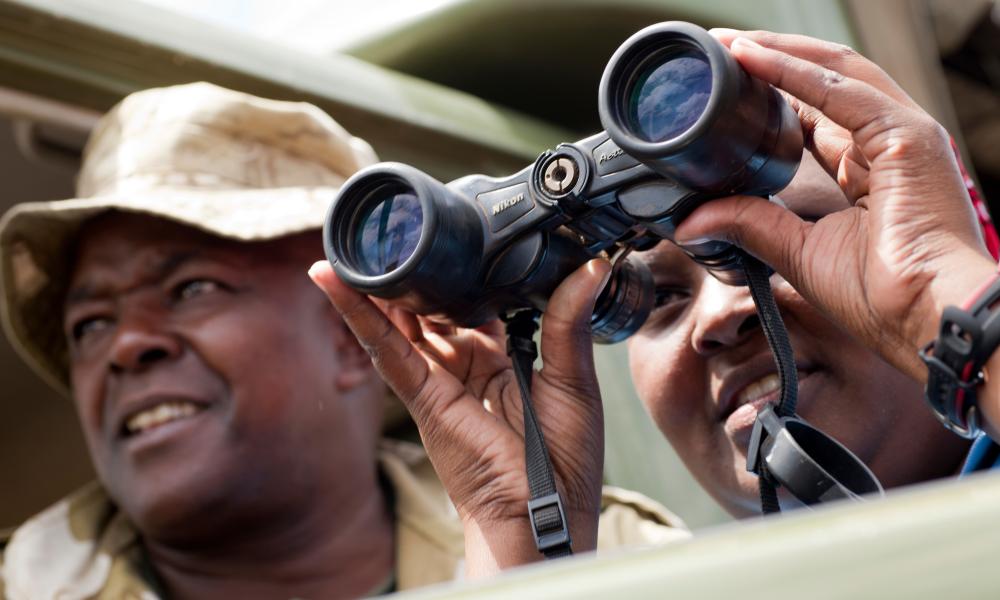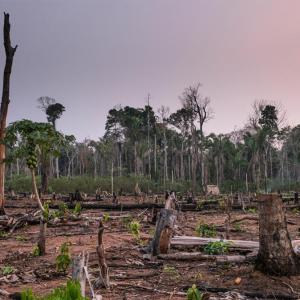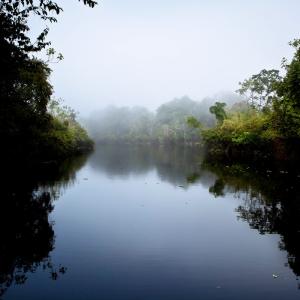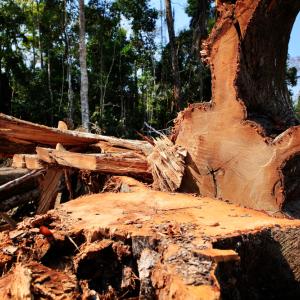Why do the fires happen?
The fires are a direct result of soaring deforestation – often carried out to illegally claim land and to clear and prepare areas for cattle farming and agriculture. Deforestation comes first and fires follow.
In the Brazilian Amazon, there has been a large increase in deforestation compared to last year – between 1 August 2019 and 31 July 2020, 9,205 sq km of rainforest were cleared, a rise of 33 per cent compared to the same period in 2018/19. This has led to fires raging again. The latest data from Brazil shows that fires in the Amazon this year are up 52% on the 10-year average.
But this isn’t just a problem for Brazil and other Latin American countries to solve alone. The destruction of amazing rainforests is often driven by global demand for products that may have come from deforested land – including demand from right here in the UK. We must be a part of the solution.
How does the situation this year compare to previous years?
This year, severe new threats are adding to the ongoing destruction of the Amazon. While the world is focused on the global COVID-19 pandemic, new laws have been proposed by the Brazilian Government that threaten the rainforest and indigenous peoples who have lived there for generations – vital protectors of the forest.
Encouraged by the words and actions of the Brazilian Government, illegal invaders are snatching more and more land from protected areas, and from indigenous peoples that have relied on it for their food and survival for generations. Covid-19 has led to reduced law enforcement, making it easier for these invaders to steal what isn’t theirs.
And now these illegal invaders are spreading Covid-19 too – with potentially devastating impacts for the Amazon’s indigenous groups and local communities. The spread of disease is taking lives and creating even greater challenges for them to protect their lands. These groups urgently need our support.
How is coronavirus affecting the Amazon?
COVID-19 poses an extreme threat to the very survival of the indigenous peoples of the Amazon, who have limited means of combatting the virus. These are communities on the frontline of protecting the Amazon, their home, where they have lived for generations.
In Brazil, the pandemic has meant reduced law enforcement on the ground, meaning indigenous lands and other protected areas are increasingly being illegally invaded by miners, loggers and cattle ranchers who – as well as stealing land that isn’t theirs and causing deforestation – spread this highly contagious virus.
Sadly, the combination of COVID-19 and fires will also be even more deadly to the people of the Amazon. Smoke and other air contamination of the fires will cause respiratory complications, only adding to the health problems caused by the virus.
Hasn’t the Brazilian Government banned fires in the Amazon? Surely this shows they’re doing what they can?
While it’s welcome that the Brazilian Government announced a 120-day ban on fires in the Amazon, the issue doesn't end there. Deforestation in the area has been rising – often encouraged by the Government’s rhetoric – and at some point, these areas of dead wood will be burnt to clear the ground. The underlying problem of deforestation is still not being properly tackled.
How much of the Amazon has been lost and is there a ‘tipping point’?
Shockingly, around 17% of the Amazon has already been destroyed. But this doesn’t tell the whole story. While it may look like there is a lot of forest still standing, we are moving perilously close to a ‘tipping point’ – where the rainforest is unable to sustain itself and the Amazon as we know it would breakdown for good.
Scientific research has shown that the Amazon will reach a ‘tipping point’ if deforestation and climate change continue, causing large parts of the Amazon to transform to a drier, degraded savannah. We don’t know for sure where the tipping point is, but some scientists believe that it could come if we destroy around 5% more.
If we go over the edge, the world’s biggest rainforest will be deformed – with devastating impacts for our climate. Huge chunks of the Amazon would stop functioning as they should, becoming drier, like a savannah, and releasing vast amounts of carbon, usually stored in the trees, into the atmosphere. The transformation would also have dire consequences for biodiversity and for regional rainfall patterns.
Once we hit a tipping point, there’s no return. The Amazon as we know it will be gone forever, and we will have lost the fight against climate change. It’s as simple as that.
You can read more about the science behind Amazon’s tipping point here.
What’s this got to do with the UK? Isn’t this a problem for the Brazilian Government?
While the Brazilian Government should certainly be doing more, the immediate threats to the Amazon are also symptoms of a deeper illness. The destruction of amazing rainforests is in part driven by global demand and international finance for products that may have come from deforested land. We can’t shy away from the fact that some products sold right here in the UK may have played a part in the destruction of nature around the globe, including in the Amazon.
This means we can – and we must – be part of the solution. Through world-leading new laws in the Environment Bill and robust trade deals as we exit the EU, the UK Government can make sure that no products sold to us in the UK are fuelling the fires in the Amazon or destroying nature around the world.
What products are causing deforestation that I should avoid?
There are some important things we can all do to minimise the environmental impact of the products we buy – for example checking that wood or paper products are FSC certified, or that any palm oil in the products we buy is RSPO certified.
But the scary truth is that it’s often not possible to know where deforestation might be hiding –particularly when it comes to our food. Soy, for example, which is sometimes linked to the destruction of nature, is often a hidden ingredient: it’s actually used as animal feed in meat and fish products. There’s no way to tell whether this is the case, or whether the soy used came from deforested land or not. That’s why we need the UK Government to introduce new laws that make sure no products imported to the UK are linked to the destruction of nature around the world.
So, while trying to avoid certain products and eating more sustainably is a great start, one of the most powerful things you can do is actually letting the UK Government know that you want to see new laws introduced as a matter of urgency.
How have the fires affected wildlife in the Amazon?
Despite covering only 1% of the planet’s surface, the Amazon is home to 10% of all the wildlife species we know about. This includes many iconic species: for example it’s estimated that over 70% of jaguars live in the Amazon. This means that every hectare of the Amazon that is destroyed puts wildlife at risk.
The best way of protecting wildlife like jaguars is to protect their home. We’ve worked in the Amazon for over 40 years, supporting indigenous peoples and local communities to protect their land and halt deforestation. And we've helped Amazon countries to create and manage protected areas and recognise indigenous peoples’ land rights.
What is WWF doing to help?
We’re working in partnership with local communities and organisations to respond to the fires, and campaigning to tackle the underlying causes of deforestation in the Amazon and beyond.
Thanks to your support, communities on the frontline have received vital equipment and training to respond to the fires, certain indigenous communities now have access to drones and training so they can monitor and protect their land from deforestation and other illegal activities, and indigenous groups trying to avoid the spread of COVID-19 have received emergency supplies. These are just some of the ways we’ve helped protect the Amazon and its people: every hectare we protect together could be vital.
But to put a stop deforestation and the fires it leads to for good, we need to tackle the underlying causes of forest destruction. That’s why we’re campaigning for stronger action from governments around the world to tackle the underlying problems and policy setbacks that cause deforestation in the Amazon and beyond.
This includes calling on the UK Government to bring in new laws that would make sure products imported to the UK aren’t fuelling the demand for deforested land, and supporting WWF in Brazil to campaign for stronger action from the Brazilian Government.
How can I help?
Each and every one of us can do something to help the Amazon and its people – together we are powerful. Whether it’s standing with indigenous peoples at this challenging time, calling for our Government to make sure they’re not adding fuel to the fire, or simply spreading the word – inaction is not an option.

Can't find the answer you're looking for?
Can't find the answer you're looking for?
We're here to help.
If you're unable to find the answer to your question within our FAQs, please get in contact with us today.
Alternatively, please see our full list of FAQs.
 3 ways you can help the Amazon Rainforest
3 ways you can help the Amazon Rainforest
 The Amazon Rainforest
The Amazon Rainforest
 Our 10 myths about deforestation
Our 10 myths about deforestation